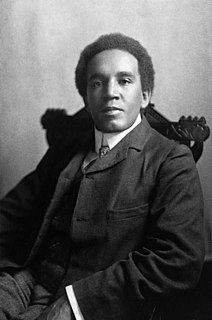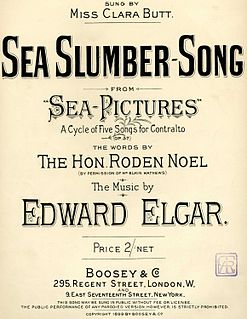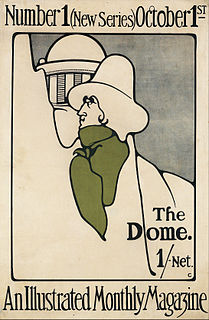
In Haven (Capri) is a poem by Caroline Alice Elgar, probably best known in its musical setting as the second (and shortest) song composed by her husband Edward Elgar for his song-cycle Sea Pictures .

In Haven (Capri) is a poem by Caroline Alice Elgar, probably best known in its musical setting as the second (and shortest) song composed by her husband Edward Elgar for his song-cycle Sea Pictures .
Elgar first set Alice's poem to music for voice and piano in 1897 and it was published in a cultural magazine "The Dome" in 1898, with the title "Love alone will stay". Alice then adapted it for Sea Pictures : she re-ordered the verses, included more allusions to the sea, and it was renamed "In Haven".
"In Haven (Capri)" | "Love Alone Will Stay" |
In the third verse, violins are added to the vocal line. It concludes with an upward scale on the violins and a pizzicato on the lower strings. [3]
As well as the recordings listed in the Sea Pictures article, In Haven has been recorded by Robert Meadmore. [4]

Sir Edward William Elgar, 1st Baronet, was an English composer, many of whose works have entered the British and international classical concert repertoire. Among his best-known compositions are orchestral works including the Enigma Variations, the Pomp and Circumstance Marches, concertos for violin and cello, and two symphonies. He also composed choral works, including The Dream of Gerontius, chamber music and songs. He was appointed Master of the King's Musick in 1924.
The Pomp and Circumstance Marches, Op. 39, are a series of five marches for orchestra composed by Sir Edward Elgar. The first four were published between 1901 and 1907, when Elgar was in his forties; the fifth was published in 1930, a few years before his death; and a sixth, compiled posthumously from sketches, was published in 1956 and in 2005–2006. They include some of Elgar's best-known compositions.

Edward Elgar composed his Variations on an Original Theme, Op. 36, popularly known as the Enigma Variations, between October 1898 and February 1899. It is an orchestral work comprising fourteen variations on an original theme.

Samuel Coleridge-Taylor was an English composer and conductor.
Sea Pictures, Op. 37 is a song cycle by Sir Edward Elgar consisting of five songs written by various poets. It was set for contralto and orchestra, though a distinct version for piano was often performed by Elgar. Many mezzo-sopranos have sung the piece.
The Music Makers, Op. 69, is a work for contralto or mezzo-soprano, chorus and orchestra composed by Edward Elgar. It was dedicated to "my friend Nicholas Kilburn". It was first performed at the Birmingham Festival on 1 October 1912, conducted by the composer, with Muriel Foster as the soloist.

"Sea Slumber Song" is a 19th-century poem by Roden Noel set to music by Sir Edward Elgar as the first song in his song-cycle Sea Pictures (1899).

"Where Corals Lie" is a poem by Richard Garnett which was set to music by Sir Edward Elgar as the fourth song in his song-cycle Sea Pictures. The poem was first published in Io in Egypt and other poems in 1859 and subsequently anthologized in Sea Music in 1888.

The Dome, subtitled consecutively "A Quarterly Containing Examples of All the Arts" and "An Illustrated Monthly Magazine and Review", was a literary periodical associated with the "Nineties" scene, edited by Ernest J. Oldmeadow, publisher and manager of The Unicorn Press based in London at 7 Cecil Court. It ran for three years, from March 1897 to July 1900. It is usually considered to be the last more or less successful attempt to deliver a valuable literary magazine with a considerable circulation, yet working from an Aestheticist rationale, according to Walter Pater's concepts.
Anthony Vincent Benedictus Collins was a British composer and conductor. He scored around 30 films in the US and the UK between 1937 and 1954, and composed the British light music classic Vanity Fair in 1952. His Decca recordings of the seven Sibelius symphonies was only the second cycle by a single conductor and orchestra to appear.
Oh, soft was the song is a song with words by Gilbert Parker set to music by the English composer Edward Elgar in 1910, as his Op. 59, No. 3. It is the second and last verse of a poem At Sea which Parker published in Volume I of a series of poems called Embers. The Opus 59 songs were part of a song-cycle of six romantic songs by Parker that was never completed – Nos 1, 2 and 4 were never composed. The other songs were Was it some Golden Star? and Twilight. The songs were originally written with piano accompaniment, but this was later re-scored by the composer for full orchestra.

Speak, Music! is a song written by the English composer Edward Elgar in 1901 as his Op.41, No.2.

"The Wind at Dawn" is a poem written by Caroline Alice Roberts, and set to music by the English composer Edward Elgar in 1888.

"Love alone will stay" is a poem by Caroline Alice Elgar, set to music for voice and piano by her husband, the English composer Edward Elgar, in 1897.
”Through the Long Days” is a song written by the English composer Edward Elgar in 1885 as his Op.16, No.2. The words are from a poem by the American writer and statesman John Hay.
"A Song in Storm" is a poem written by Rudyard Kipling (1865-1936).

The Fringes of the Fleet is a booklet written in 1915 by Rudyard Kipling (1865–1936). The booklet contains essays and poems about nautical subjects in World War I.

Salut d'Amour (Liebesgruß), Op. 12, is a musical work composed by Edward Elgar in 1888, originally written for violin and piano.

Caroline Alice, Lady Elgar was an English author of verse and prose fiction, who married the composer Edward Elgar.
{{cite journal}}: Cite journal requires |journal= (help)